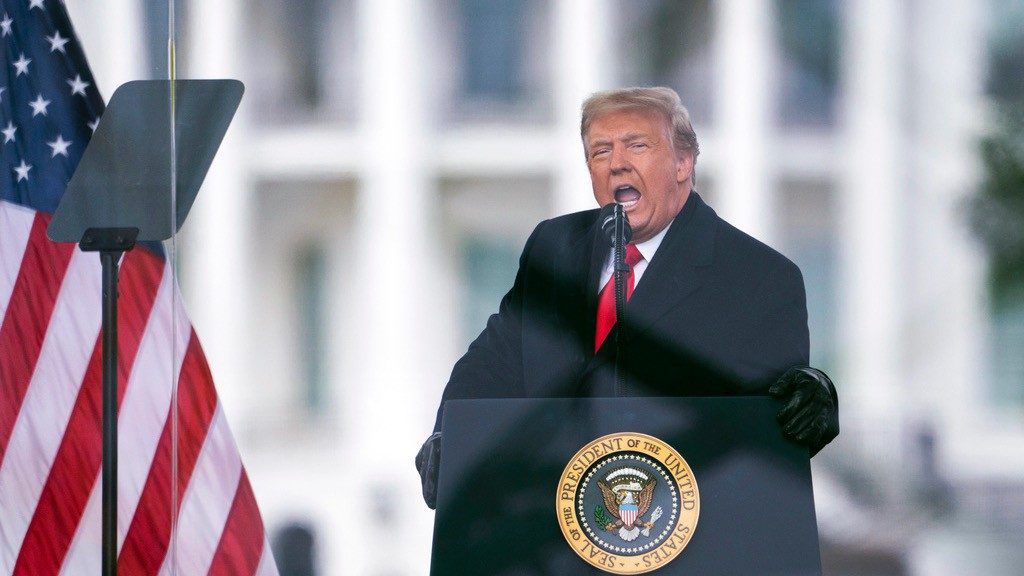The Supreme Court on Friday denied special counsel Jack Smith's request to quickly consider whether former President Donald Trump is immune from criminal charges in the 2020 election interference case.
The high court could still hear the case, however, after a federal appeals court in Washington considers the matter in the coming weeks.
The U.S. Court of Appeals for the District of Columbia Circuit will soon begin considering the matter, and has signaled that it will act quickly; arguments are scheduled to begin on Jan. 9.
But the timing of the appellate court's decision, as well as a likely appeal to the Supreme Court, could delay the beginning of the trial against the former president, which is currently scheduled to begin March 4. The decision, in a one-sentence order with no noted dissents, delivers a win for Trump, whose lawyers urged the high court to let the appeals court weigh in first.
In a post on his social media platform, Trump hailed the high court for rejecting "Deranged Jack Smith’s desperate attempt to short circuit our Great Constitution," echoing an oft-used insult against the special counsel -- though despite his comments, the matter is still likely to appear before the Supreme Court in the coming weeks. The former president also went on to insist that he is "entitled to Presidential Immunity" and espoused falsehoods about the 2020 election being "rigged and stolen."
There is no evidence of widespread voter fraud inin the 2020 presidential election, a statement expressed by officials in both parties, including Trump’s own attorney general William Barr. Numerous court cases across the country challenging the 2020 election were thrown out in federal and state courts, including the U.S. Supreme Court. No evidence emerged from a litany of federal, state and outside investigations of voter fraud that could have changed the outcome of the election.
Trump faces four felony charges in the case, including conspiracy to defraud the United States, in Smith's probe of his alleged efforts to overturn the results of Joe Biden's win in the 2020 presidential election. Trump pleaded not guilty to all charges in August and has denied any wrongdoing.
The case is one of four criminal proceedings against the former president in federal and state courts, including a separate case in Fulton County, Georgia, related to alleged efforts to overturn the election results in the state. He also faces federal charges in Florida about alleged mishandling of classified documents and state charges in New York about falsifying business records in relation to alleged hush-money payments to an adult film star. The former president has pleaded not guilty to all 91 felony charges against him.
Separately, the Supreme Court also recently agreed to hear a challenge to one of the charges being levied against Trump in the federal 2020 election case, which has also been used to prosecute hundreds related to the Jan. 6, 2021, insurrection at the U.S. Capitol.
Smith in his request to the high court said that the case "presents a fundamental question at the heart of our democracy: whether a former president is absolutely immune from federal prosecution for crimes committed while in office or is constitutionally protected from federal prosecution when he has been impeached but not convicted before the criminal proceedings begin."
"It is of imperative public importance that respondent’s claims of immunity be resolved by this Court and that respondent’s trial proceed as promptly as possible if his claim of immunity is rejected," Smith wrote.
U.S. District Court Judge Tanya Chutkan has already put the case on hold while Trump pursues his claim that he is immune from prosecution. Chutkan has raised the possibility of keeping the March date if the case promptly returns to her court.
She already has rejected the Trump team’s arguments that an ex-president could not be prosecuted over acts that fall within the official duties of the job.
“Former presidents enjoy no special conditions on their federal criminal liability,” Chutkan wrote in her Dec. 1 ruling. “Defendant may be subject to federal investigation, indictment, prosecution, conviction, and punishment for any criminal acts undertaken while in office.”
Trump’s lawyers have for months signaled that they would ultimately ask the Supreme Court to take up the immunity question. But this week, they urged the justices to stand down for now.
“Importance does not automatically necessitate speed," Trump’s lawyers wrote. "If anything, the opposite is usually true. Novel, complex, sensitive and historic issues — such as the existence of presidential immunity from criminal prosecution for official acts — call for more careful deliberation, not less."
The high court still could act quickly once the appeals court issues its decision. A Supreme Court case usually lasts several months, but on rare occasions, the justices shift into high gear.
Nearly 50 years ago, the justices acted within two months of being asked to force President Richard Nixon to turn over Oval Office recordings in the Watergate scandal. The tapes were then used later in 1974 in the corruption prosecutions of Nixon’s former aides.
Smith cited the Nixon tapes in his brief, writing: "As in [United States v.] Nixon, the circumstances warrant expedited proceedings at the certiorari stage and, if the court grants review, on the merits. "The public importance of the issues, the imminence of the scheduled trial date and the need for a prompt and final resolution of respondent’s immunity claims counsel in favor of this court’s expedited review at this time
It took the high court just a few days to effectively decide the 2000 presidential election for Republican George W. Bush over Democrat Al Gore.
The Associated Press contributed to this report.




